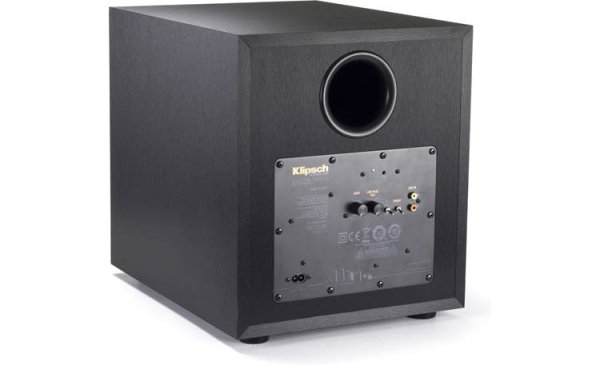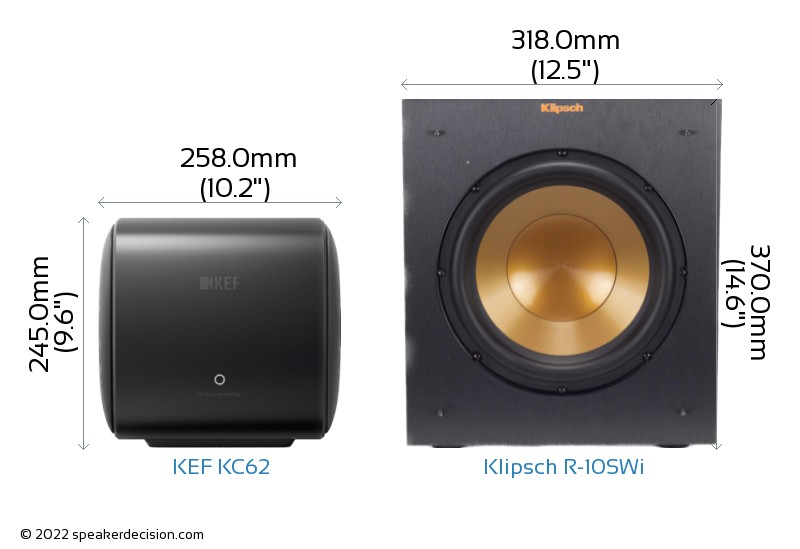In this review, we will be comparing KC62 and R-10SWi, two Powered Subwoofer speakers from KEF and Klipsch. Being Powered subwoofers, they both have built-in amplifiers so you don't need an external power amp or an integrated amp to power them. Let's have a brief look at the main features of KEF KC62 and Klipsch R-10SWi first before getting into our more detailed comparison.
In the following sections, we will get into details in order to better understand how the KEF KC62 and Klipsch R-10SWi compare and hopefully end up with enough arguments to decide which one of these subwoofers is the better choice for you.
**This post contains affiliate links, and I will be compensated if you make a purchase after clicking through my links. As an Amazon Associate I earn from qualifying purchases.
Drivers
The efficiency of a subwoofer is directly proportional to the total radiating are squared hence the woofer quantity and diameter.KEF KC62 and Klipsch R-10SWi have a totally different setup: the KEF KC62 features 2 x 6.5-inch drivers whereas the R-10SWi features 1 x 10-inch drivers.
Frequency Response
KC62 has a frequency range of 11-200 Hz whereas R-10SWi has a frequency range of 32-120 Hz. With a minimum frequency of 11Hz, the KC62 can go significantly deeper on the low side and provide stronger bass compared to the R-10SWi's min frequency of 32Hz.
Below graphs depict how these two speakers compare with the max, min and average values of the Min and Max Frequencies of other speakers in the Subwoofer class in our database.
Low Frequency
Subwoofer Speakers
High Frequency
Subwoofer Speakers
Cabinet Type
The KEF KC62 has a Acoustic Suspension type cabinet. Acoustic Suspension aka Sealed type subwoofers have enclosures that are sealed hence no ports or holes exists on the cabinet. Sealed designs helps to provide more accurate and tight bass responses compared to ported designs. On the other hand the Klipsch R-10SWi have Bass Reflex type enclosure. Bass Reflex type subwoofers (aka Ported, Vented or Reflex Port) have enclosures that uses a port, hole or vent cut into the cabinet. Ported designs are generally more efficient than the Sealed designs.
 Klipsch R-10SWi Port
Klipsch R-10SWi Port
Physical Specs
Size of a speaker can sometimes become an important decision factor due to space constraints or in some cases purely for esthetic reasons. In this section, we are going to compare KEF KC62's and Klipsch R-10SWi's external dimensions. KEF KC62 has external dimensions of 245.0 x 258.0 x 281.0mm ( 9-5/8inch x 10-1/8inch x 11-1/16inch ) whereas Klipsch R-10SWi has external dimensions of 370.0 x 318.0 x 462.0mm ( 14-9/16 x 12-1/2 x 18-3/16inch) .
Klipsch R-10SWi is clearly the larger of the two speakers. Its body is 60mm wider, 125mm taller and 181mm deeper than KEF KC62.
Below you can see the front view size comparison of KEF KC62 and Klipsch R-10SWi in scale.
 Comparison image of KEF KC62 and Klipsch R-10SWi Size and External Dimensions
Comparison image of KEF KC62 and Klipsch R-10SWi Size and External Dimensions
Base Surface Area Comparison
Base surface area of a loudspeaker may become a determining factor when the space in your room or desk is limited.
The base surface area of the KEF KC62 is approximately 725.0cm2 / 112.4inch2 and base area of the Klipsch R-10SWi is approximately 1469.2cm2 / 227.7inch2. The KC62 requires 51% less surface area than the R-10SWi which gives it a small advantage on placement in tight spaces.
Weight Comparison The weight of a subwoofer may become an important factor if you need to move and reposition the unit often to find the optimal positioning, also known as 'Subwoofer Crawling'. The KEF KC62 weighs 14.05kg / 30.9lbs and the Klipsch R-10SWi weighs 11.59kg / 25.5lbs. This makes the KC62 21% heavier than the R-10SWi.
Here is a comparison of how KC62 and R-10SWi's weights compare with the average, max and min weights in Powered Subwoofer class.
Weight
All Subwoofer Speakers
What's in the Box of KEF KC62?
Here are the items that are included inside the box of KC62:
Powered subwoofer6.5-feet AC power cordSpeaker-level input blockUser ManualImportant Safety InformationWarranty Information
What's in the Box of Klipsch R-10SWi?
Here are the items that come with the R-10SWi:
Powered subWireless transmitter (attached 12
 Number of Woofers Number of Woofers |
2
vs
1
|
More woofers |
 Low Frequency Response Low Frequency Response |
11 Hz
vs
32 Hz
|
Generates deeper bass |
 High Frequency Response High Frequency Response |
200k Hz
vs
120k Hz
|
Generates higher frequency |
 Height Height |
245mm
vs
370mm
|
Easier to fit in smaller spaces |
 Base Surface Area Base Surface Area |
725cm2
vs
1469cm2
|
Takes less floor space |
 Woofer Size Woofer Size |
10 inches
vs
6.5 inches
|
Larger woofer |
 Price per pair* Price per pair* |
274USD
vs
1500USD
|
costs less (*prices may change depending on the seller, location and time) |
| General |
KEF KC62 |
Klipsch Reference R-10SWi |
| Brand |
KEF |
Klipsch |
| Speaker Type |
Powered Subwoofer |
Powered Subwoofer |
| Max Amplifier Output |
1000 watts |
150 watts |
| Frequency Response |
11-200 Hz |
32-120 Hz |
Amplifier |
|
|
| Watts RMS (Continuous) |
1000-watt RMS |
150-watt RMS |
| Watts Peak (Max) |
n/a |
300-watt RMS |
Drivers |
|
|
| Woofer Quantity |
2 |
1 |
| Woofer Size |
6.5" |
10" |
| Woofer Composition |
|
Copper IMG |
| Tweeter Size |
- |
- |
| Aimable Tweeter |
No |
No |
| Midrange Driver |
No |
No |
| Firing Direction |
side |
rear |
Physical Specs |
|
|
| Height |
245.0mm (9.6") |
370.0mm (14.6") |
| Width |
258.0mm (10.2") |
318.0mm (12.5") |
| Depth |
281.0mm (11.1") |
462.0mm (18.2") |
| Weight |
14.05kg (30.9lbs) |
11.59kg (25.5lbs) |
| Enclosure |
Acoustic Suspension |
Bass Reflex |
| Grille |
n/a |
Yes |
| Moisture Resistancy |
No |
No |
Connections |
|
|
Other |
|
|
| Parts Warranty |
2 Years |
2 Years |
| Labor Warranty |
2 Years |
2 Years |